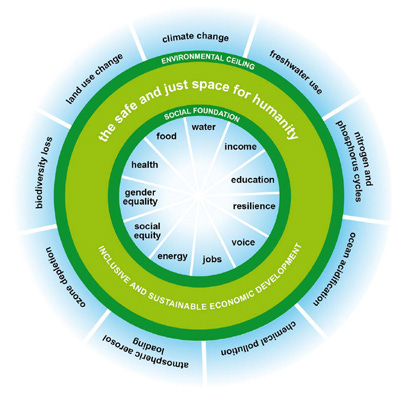

Where many people globally live below the social foundation in every category and the ecological systems – on which we all depend for our survival – are under unsustainable pressure. Unfortunately, reality looks like more like this The sweet spot for humanity lies between the social foundation below which nobody should fall and the ecological ceiling which is necessary to protect our Earth. Her idea of the doughnut looks like this: Die Theorie wurde im Jahr 2017 in Raworths Buch Doughnut Economics: Seven Ways to Think Like a 21st-Century Economist vertieft. Februar 2012 in einem Beitrag mit dem Titel A Safe and Just Space for Humanity von Kate Raworth vorgestellt. Raworth’s argument is that we need to redesign the system so that all people can thrive in a way which protects the planet that we all depend on. Die Theorie der Donut-Ökonomie wurde erstmals am 13. If you apply this logic to the recent statement that Oxfam made about the wealth of the ten richest people in the world rising by £400bn since the start of the pandemic, the world starts to look very sick indeed. After that, continued growth becomes unhealthy and harmful – think cancer. She argues that, in nature, growth is only desirable until the point of maturity.

To be precise, they are all talking about ‘Doughnut Economics’, and in the case of Amsterdam and Brussels, their leaders have begun changing the way the city thinks about its people and the environment in an effort to address climate change and inequality.ĭoughnut Economics? In 2017, Oxford academic Kate Raworth published a book called ‘Doughnut Economics: Seven Ways to Think Like a 21st Century Economist’, in which she suggests that the 20th Century economic model of continuous growth is, not only out of date, but inherently harmful both to people and the planet. What do Amsterdam, Brussels, Copenhagen, Time magazine and Joe Biden’s transition team have in common?


 0 kommentar(er)
0 kommentar(er)
